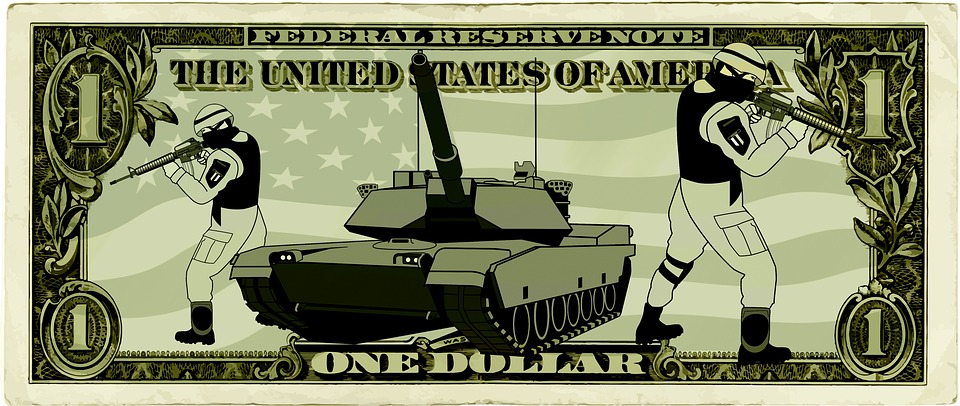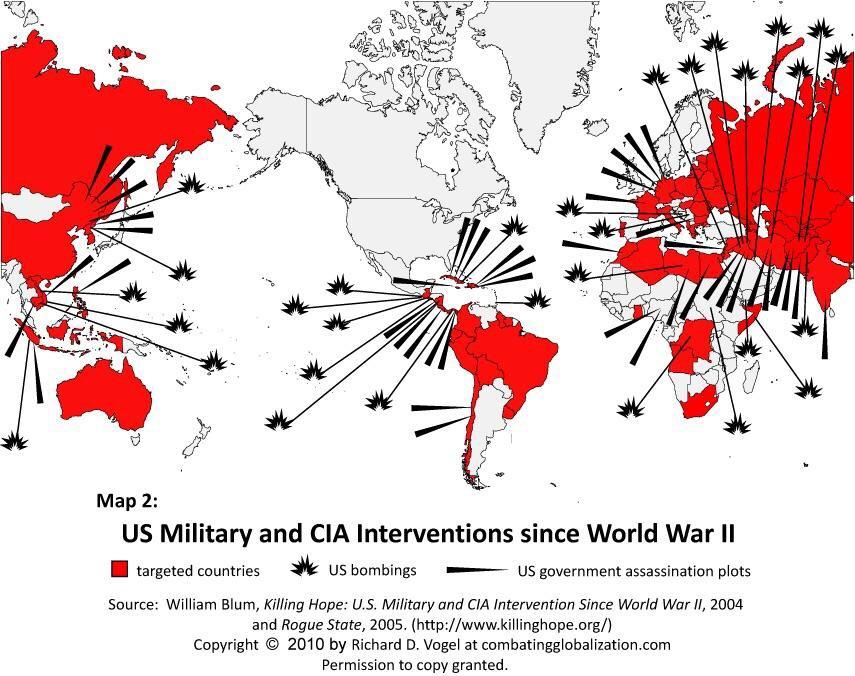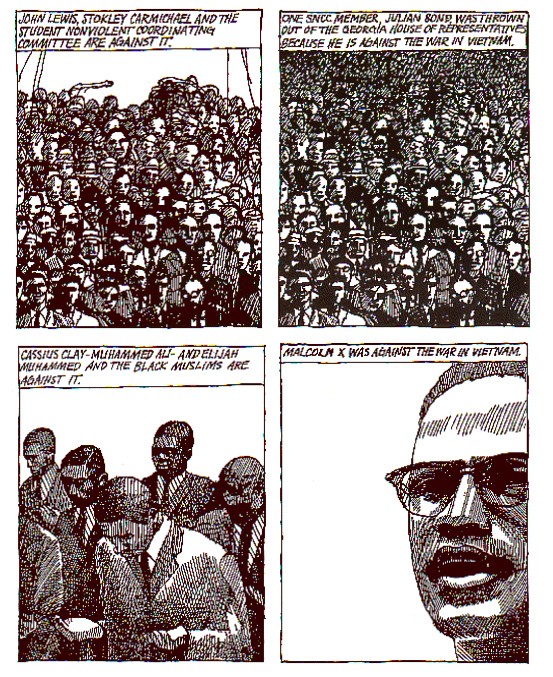Murder Incorporated: Empire, Genocide and Manifest Destiny.
Book Two: America’s Favorite Pastime.
Mumia Abu-Jamal and Stephen Vittoria. Foreword by S. Brian Wilson, Afterword by David Swanson.
Prison Radio, 504 pp. $27.
By Todd Steven Burroughs
WHO KNEW THAT Superman was once an anti-war socialist? In Superman No. 1, published by DC Comics in 1939, the Man of Steel stops a war in San Monte in South America by kidnapping the generals of both sides. He explains to them that their armies are only fighting to promote the sale of weapons, and the shocked generals shake hands. The fact that the two young American men who created Superman were conscious enough to put that in a comicbook that DC would publish shows how clear Americans were about the futility of war then. Then the Japanese detonate Pearl Harbor in December 1941, and Superman becomes the biggest Allied bomb ever, and afterwards, a caped Cold Warrior in the 1950s who now unequivocally stood for “truth, justice and the American Way” (as opposed to the Soviet Communistic way).

The above might be the only anti-war pop-culture reference not mentioned by Mumia Abu-Jamal and Stephen Vittoria in their second joyful, playful gesture of political-literary defiance—an act of historical witnessing, using sweat to honor innocent blood that has filled history’s reservoirs. This book, the first work of history this writer has ever read that had a “Get Smart” joke in it, is an American history of war devoted to two groups without guns or butter: the victims of war and those devoted to fighting it. As with their first volume, published last year, their clarity is extraordinary in its purity: President Lex Luthor is an “orange dumpster fire,” Barack Obama is “the white-coated waiter on the Pullman car of empire” who is guilty of conducting a “thuggish and criminal mugging” on Yemen using drones commanded by soldiers socialized to kill through U.S. military-consulted and -approved videogames, and American public life is captured by forms of propaganda as diverse as the Hollywood blockbuster Saving Private Ryan and TV pundit “military-academic complex.”

IS WAR NATURE or nurture? It seems a complicated answer, until the last century is analyzed and the story is told as to how America became unapologetic proponent of permanent war. Sometimes it seems that the authors have forgotten that war existed before the growth of the 20th century West and its eventual, post-World War II American coronation. Isn’t the human spirit naturally rebellious, and war just state-sanctioned rebellion? Perhaps, but Abu-Jamal and Vittoria spend at least two hundred pages talking about how for over a century the United States either set up wars or made sure war would happen in virtually every corner of the world. Even World War II—a war that is never seen in America’s historic popular culture as anything but inevitable–is not spared the pre-Pearl Harbor, what-if-this-action-or-that-had-been-acted-on scenario. They argue that war, not just land, became profitable in the 20th century, and the United States decided early on that it wanted the top sales numbers.
Here’s socialist-ish Superman’s point, argued by the authors, from the pre-U.S.-entry-into-World War II 1930s: “Under the heading of ‘love the one you’re with,’ these captains of industry, despite being [initially] rebuffed by FDR, were nevertheless finding buyers elsewhere. For years, Germany, Italy and Japan were aggressively building their own military-industrial complexes” with help from American industrialists. So, writes Vittoria and Abu-Jamal, “this allowed American munitions manufacturers, the aeronautics industry, as well as American industry up and down the assembly line to cash in all angles, enemies and allies alike.”
The best part of the book is the extended discussion of the birth and work of the Central Intelligence Agency, one of the greatest defenders of empire that has ever existed. Using a who’s who of the 20th and 21st century Left as sources, the authors unapologetically state that the United States, aided by the CIA, is guilty of making war into a science and business, serving the needs of war capitalists Superman openly talked against in 1939. So, decades later, when Indonesia invades East Timor in 1975 with America’s guidance, “(i)t was an invasion of the body snatchers. It was the British Empire colonizing and force-dividing India. It was the Euro-American Empire colonizing and force-civilizing the indigenous people of the Americas—chock full of the same religious fanaticism and xenophobic rage. And to accomplish a civilizing undertaking, the colonizer must first control the colonized population.”
Vittoria and Abu-Jamal connect dots in time and space, in thought and in act. The fact that the authors’ argument is politically simple doesn’t make it factually incorrect: America is indeed guilty of nurturing evil for decades around the world in the name of capitalism, White American Christianity, and a lust for oil and power. In the end, the book cares more about the development of empire technology and its evil use than debating the nature-nurture question.


THIS BOOK TRILOGY yearns to document America in ways that will never be examined by, or gain the approval of, say, The New Republic and MSNBC. Is this angry-but-funny book series the last gasps of dying Black Panther/SNCC/Weatherman political education classes, or future schooltexts for the next wave of Saul Alinksy disciples around the world? Revolutionaries are constantly at war with hegemony, after all, so oppression and injustice will never take a holiday, even with Luthor gone from The White House either next year or five years from now. No one can tell in June 2019, as Luthor seeks to reproduce its white, mucous-filled sludge and pour it all over brown people in American concentration camps.
This question can only be answered when Democratic Party hegemony reasserts itself in the White House, and then the offended folks, now relaxed and ready to enjoy the coming mid-21st century, will have the option to happily fade back to the complacency of National Public Radio and Sunday New York Times. Baby Boomers Abu-Jamal and Vittoria know the bloody, painful difference between a revolutionary and an activist, but who else does?
Meanwhile, away from that question, far from most of alternating noise and silence over the decades, one of the authors has been imprisoned from his arrest in December 1981 at the age of 27 to now 65—38 years, an entire adulthood and middle age gone. In his own never-ending-battle against fading like old, yellowing Philadelphia Tribune newspapers he wrote for in a city main library he probably used to go to, the imprisoned writer finds himself in an interesting literary position: like Black sports icons Tiger Woods and Serena Williams, Mumia Abu-Jamal is only a few steps away from being framed again, but this time around the two Ls of legacy and legend.
-30-
Todd Steven Burroughs, Ph.D., is an independent researcher and writer based in Newark, N.J. He is the author of Warrior Princess: A People’s Biography of Ida B. Wells, and Marvel’s Black Panther: A Comic Book Biography, From Stan Lee to Ta-Nehisi Coates, both published by Diasporic Africa Press. His 2014 audiobook, Son-Shine On Cracked Sidewalks, deals with the first mayoral election of Ras Baraka, the son of the late activist and writer Amiri Baraka, in Newark. He is working on a journalistic, and, perhaps now, literary biography of Abu-Jamal.
Couldn’t get any better than this
THANK YOU!